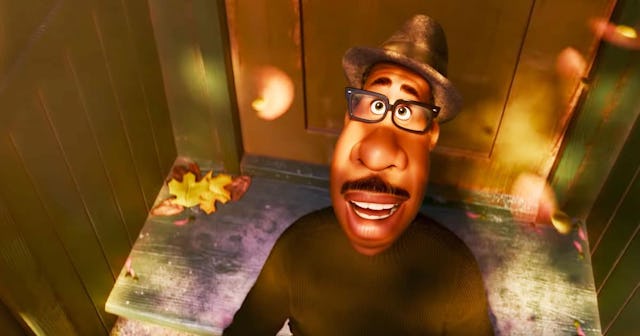Why Pixar's New Movie 'Soul' Means So Much To My Family

First, it was Coco. Now, Disney Pixar’s Soul is bringing yet another endearing kids film to help little ones cope with death. The bad news is it doesn’t hit theaters until June 2020. But leap for joy, for the trailer is here and it is beautiful.
While we aren’t given a slew of spoilers, we can tell that Soul closely follows middle school band teacher and jazz musician Joe (Jamie Foxx) in the event of his death. After taking a single wrong step in life (quite literally), Joe winds up becoming a different type of teacher in the afterlife — one that teaches souls how to live their lives with meaning before they’ve reached their human-form.
The teaser-trailer introduces us to 22 (voiced by Tina Fey), a quirky and lively character who relies on Joe’s insight before she makes her big debut into the “real world.” And aside from being the first Pixar movie with a black lead, Soul, similar to Coco, carries the potential to open the conversation surrounding death and grief with our children.
When we are cut, we bleed. In the same way, when someone we love dies, we grieve. Whether the loss is felt at seven or 77 years old, the hurt is still hurt. And while this new Pixar film doesn’t appear to focus on the mourning aspect of loss as much as the importance of living every moment we are given to the fullest, movies like Soul have the capacity to further normalize death for our little ones.
One out of every 20 kids aged 15 and under will lose a parent. But my kids fell into the 5-8% of kids who have lost a sibling. I’ve been on this journey with my children since they were nearly two years old after their sister, my then-youngest daughter, died from SIDS. And as I’ve learned, with the title of a bereaved mother, also comes the responsibility of forever seeing my surviving children through their grief.
They ask me where their sissy is, why she is gone, and (when it’s the most difficult) if she still loves them… tearing my heart further with each gut-wrenching question.
I’ve assumed my new role as well as can be expected, but that doesn’t mean I don’t find myself feeling stumped. I don’t have all the answers, and I can’t always put what I want to say into a kids’ terms. But when my children recognize the subject of death targeted in a way which is appealing to their age group, much like I witnessed during Coco and foresee with Soul, it draws them in to pay attention.
You can see their mind spinning before they nudge me and ask, “Is that what happens when you die? Did that happen to Lainey?”
And though I can’t respond with anything that’s concrete, an opportunity to help my kids cope through their sister’s death is presented.
There are children all around us who have felt the aftermath of death far too soon in their lives. And socially, we have done a poor job of recognizing and making space for their pain. Not only that, but we have given these kids little-to-no representation of the most pivotal point in their lives and their family’s lives.
We aren’t promised tomorrow. We know that. And in truth, we don’t want to think about that, let alone, tell our children that. But shouldn’t we want our kids to be introduced to this truth in the horrible turn of events that something tragic does happen? Without making our children fearful, and without being morbid, don’t we want our kids to understand that death isn’t some mystical and evil happening? That even when it’s totally unfair and beyond premature, it is still natural?
The way I react, and the way society reacts, regarding the loss of my kids’ sister will forever shape their entire grieving process. And as a whole, we owe it to every grieving child to remove the cloak of shame surrounding death. Because for kids who have made their peace with it, and even for those who have not, it is a part of them… one that’s not easily ignored even when it goes unacknowledged.
But if we begin to open a gateway with our children which comfortably allows them to speak and ask the hard questions about death, whether it be through personal experience, or even a scene in a movie, these kids will then form that same openness with others… other children who may be grieving, misunderstood, and aching for a bridge which connects their mournful-world to everyone else’s seemingly-normal one.
With the rise of movies like Soul, and how can we forget the charming Coco, which depict the event of death in a simplistic, whimsical and kid-friendly manner, comes the fall of the crushing stigma surrounding death, and the potential to help so many grieving children feel seen.
This article was originally published on